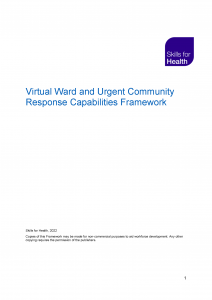Virtual Ward and Urgent Community Response Capabilities Framework
Background
In response to the pandemic, there has been a period of rapid innovation and transformational change in service delivery. Virtual wards and Urgent Community Response amongst others have formed part of this.
Virtual wards
A virtual ward is a safe and efficient alternative to NHS bedded care that is enabled by technology. Thousands of people across England are already benefitting from being treated at home on a virtual ward. This innovative approach is delivering high quality care, safely and conveniently for people at home – where they would rather be.
Virtual wards should be led by a named registered consultant practitioner i.e., doctor, nurse, allied health professional or primary care GP with knowledge and capability in the relevant specialty or model (frailty and respiratory care).
Urgent community response
Two-hour urgent community response teams provide assessment, treatment, and support to people over the age of 18 in their own home or usual place of residence who are experiencing a health or social care crisis, and are at risk of admission or re-admission to hospital within the next two to 24 hours without intervention to prevent further deterioration and to keep them safe at home. Assessment and care should start within two hours of the referral being made, with short-term interventions typically lasting under 48 hours. Teams are expected to work in an interdisciplinary way, and often consist of registered nurses, advanced clinical practitioners, physiotherapists, occupational therapists, support staff, social workers and paramedics, with support from other relevant professionals.
Virtually all parts of England are providing 2-hour UCR twelve hours a day, 7 days a week with ongoing scaling and workforce development taking place to ensure consistency and improve the quality of UCR services to achieved expected impact for patients and services. The ambition is that every patient across England can expect the same access to care, in line with clinical conditions set out in national guidance, and that referring services such as ambulance teams provide support available via UCR.
Purpose and Scope of the Framework
To support our workforce to develop and build confidence and capability to provide safe and quality services, NHS England commissioned Skills for Health to develop a core skills and capabilities framework for urgent community response and virtual wards. This framework is key to informing workforce education, training and career progression as well as informing local workforce models.
The framework provides a standard and greater clarity on the scope of practice for nurses, allied health professionals and support workers in multi-disciplinary teams working within virtual wards and urgent community response teams in the community.
This framework builds on existing good practice and sets out the core skills and capabilities for health and care professionals working in these teams. The framework describes the new skills and capabilities required to enable effective and efficient use of new technologies and digitalisation.
Structure of the Framework
The framework contains 11 core capabilities, common to the delivery of high quality, personalised care in the virtual ward and within urgent community response services; 4 capabilities specific to the delivery of care within urgent community response services, and 4 capabilities which relate specifically to the delivery of care within the virtual ward.
Download the Framework

Sign up to receive updates from Skills for Health
By signing up to our monthly newsletter, HealthView, you can hear all the latest news and developments on our work – including framework updates, consultations or launches.
